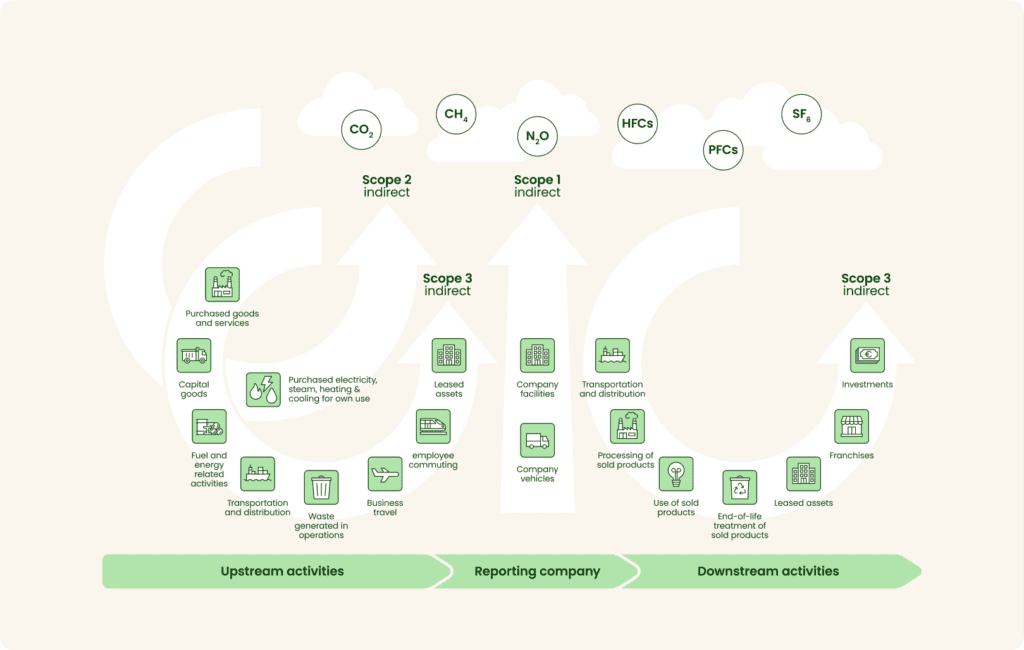Methodology
Root combines two widely used footprinting methodologies:
Greenhouse Gas (GHG) Protocol and Life Cycle Assessment (LCA)
Our approach
In essence, both GHG and LCA allow emissions to be compiled in the same way: record all the things you do, measure the impact of each and add them up. However, the difference lies in the quality of the insights and the subsequent actions you can take as a company. Let us explain why.
In essence, both GHG and LCA allow emissions to be compiled in the same way: record all the things you do, measure the impact of each and add them up. However, the difference lies in the quality of the insights and the subsequent actions you can take as a company. Let us explain why.
Greenhouse Gas Protocol
The GHG Protocol can be seen as the normalised reporting standard in terms of carbon accounting. It targets the emissions of an entire organisation and divides them into three scopes. Scope 1 and 2 are company-related emissions and mandatory to report, whereas scope 3 emissions occur along the life cycle of products and are still voluntary. They represent the holy grail of emissions, as they are the hardest to monitor while they often account for more than 90% of the total carbon footprint.
Greenhouse Gas Protocol
The GHG Protocol can be seen as the normalised reporting standard in terms of carbon accounting. It targets the emissions of an entire organisation and divides them into three scopes. Scope 1 and 2 are company-related emissions and mandatory to report, whereas scope 3 emissions occur along the life cycle of products and are still voluntary. They represent the holy grail of emissions, as they are the hardest to monitor while they often account for more than 90% of the total carbon footprint
Life Cycle Assessment
For a successful measurement of all value chain emissions, a product life cycle approach must be adopted. For this reason, we have adopted the LCA methodology as the integral foundation for Root, as it is specifically designed to map the impact of products and highlight where reduction strategies are most effective. We do this through the lens of the GHG Protocol, to assure the completeness of the reporting criteria.
Best of both worlds
Root combines the accuracy of the Life Cycle Assessment with the inclusiveness of the Greenhouse Gas Protocol. Our unique approach makes your environmental reporting more accurate and your reduction more effective.
How we measure your environmental footprint
How we measure your environmental footprint
Connecting your data sources
Every footprint calculation starts with data collection. At Root, we are well aware that this process can be overwhelming. That is why we guide you through the process from the start.
- Root uses data sources from already available management systems, such as ERP for the bill of materials, CRM for customer impacts and other systems for matters such as energy consumption and travel.
- Through our straightforward onboarding platform, your data collection has never been so easy. We guide you through various modules allowing you to get an overview of your entire business in no time.
- Your data is safely stored in your own Root client database. Once uploaded, forever remembered. Saving you time and effort.
Transforming the data
Once all data is retrieved, your job is done. Our smart data conversion automatically transforms uploaded data to the desired LCA format.
- APIs are used to record all possible life cycle routes of your products and services.
- Automatic allocations ensure that impacts are generated per product, supplier, site and customer.
Calculating your impact
- Smart API connections are used to automatically match the LCA data to its corresponding reference in the Root database.
- Ecoinvent and ReCiPe are internationally recognised and the world’s most commonly used combination for LCA.
- We measure your total environmental footprint. This means that next to the carbon footprint, we also measure all other environmental impacts such as human health, biodiversity, resource depletion and the circular economy.
Best of both worlds
Root combines the accuracy of the Life Cycle Assessment with the inclusiveness of the Greenhouse Gas Protocol. Our unique approach makes your environmental reporting more accurate and your reduction more effective.


